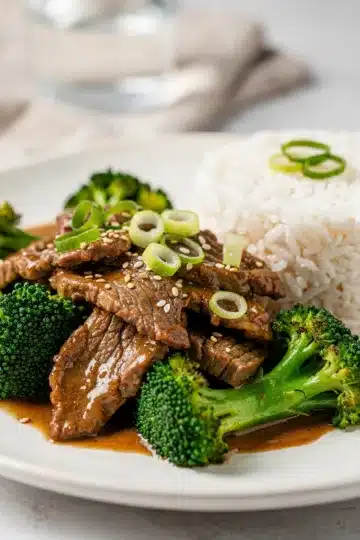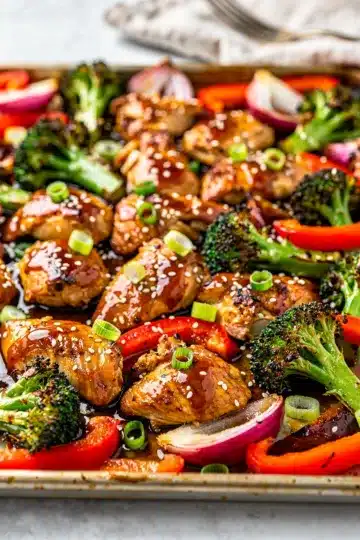There’s something almost magical about the sizzle of a hot wok, the savory steam rising as ingredients dance together in perfect harmony. For me, that sound is the soundtrack to a successful weeknight. It’s the promise of a meal that feels both exciting and effortless, a dish that can turn a tired Tuesday into a special occasion. This is the exact feeling I chase every time I make my favorite Japanese stir fries udon noodles. It’s my go-to, my secret weapon, the recipe I pull out when time is short but my standards for flavor are sky-high.
This isn’t just another stir fry recipe. It’s a 20-minute journey to a comforting, savory, and deeply satisfying bowl of goodness. The thick, chewy udon noodles are the star, providing a wonderfully substantial base that soaks up the simple, homemade sauce beautifully. Whether you’re a seasoned home cook or just starting out, this guide will walk you through creating a flawless plate of yaki udon that rivals your favorite takeout spot, but from the comfort of your own kitchen.
Table of Contents
Ingredients for Japanese Stir Fries Udon Noodles

The beauty of Japanese stir fries udon noodles lies in the simplicity of its ingredients and the power of a well-balanced sauce. Here’s what you’ll need to bring this dish to life.
For the Stir Fry:
- 1 (7-ounce) package pre-cooked udon noodles
- 1 tablespoon neutral oil (like avocado or canola)
- 2 cloves garlic, minced
- 1 teaspoon freshly grated ginger
- 1 small onion, thinly sliced
- 1 medium carrot, julienned or thinly sliced
- 1 cup shredded green cabbage
- 1 bell pepper (any color), thinly sliced
- Optional protein: 1 chicken breast (thinly sliced), or a handful of medium shrimp, or ½ block of firm tofu (cubed)
For the Yaki Udon Sauce:
- 2 tablespoons soy sauce (or tamari for gluten-free)
- 1 tablespoon oyster sauce (or vegetarian oyster sauce)
- 1 tablespoon mirin
- 1 teaspoon toasted sesame oil
- 1 teaspoon sugar or honey
- A pinch of red pepper flakes (optional, for heat)
For Garnish:
- Sliced green onions
- Sesame seeds
- Aonori (dried seaweed flakes), if available
Smart Swaps: No mirin? Use a half teaspoon of sugar mixed with a tablespoon of rice vinegar or dry sherry. Don’t have fresh udon? Dried udon noodles work perfectly; just boil them according to package directions until al dente before stir-frying. For a different take on a savory noodle dish, you might also enjoy our Creamy Miso Udon.
Timing for Your Udon Noodle Stir Fry
- Prep Time: 10 minutes
- Cook Time: 10 minutes
- Total Time: 20 minutes
That’s right—from fridge to table in less time than it takes to decide on and wait for delivery. This is nearly 50% faster than many other from-scratch noodle dishes, making it a true weeknight champion.
Step-by-Step Instructions for Perfect Udon Noodles
The key to a great stir fry is organization. Have all your ingredients prepped and within arm's reach before you even turn on the heat. The cooking process is fast and furious!
Prep the Noodles and Sauce: If your pre-cooked udon noodles are stuck together, rinse them under warm water and gently separate them with your fingers. In a small bowl, whisk together all the sauce ingredients—soy sauce, oyster sauce, mirin, sesame oil, and sugar. Set both aside.
Stir-Fry the Aromatics and Protein: Heat the oil in a large wok or skillet over medium-high heat until it shimmers. If using a protein like chicken or tofu, add it now and cook until nearly done through. Push the protein to one side of the pan. Add the garlic and ginger to the empty space and stir-fry for just 30 seconds until incredibly fragrant. Be careful not to burn them!
Cook the Vegetables: Add the onion, carrot, and bell pepper to the pan. Stir-fry for 2-3 minutes until they just begin to soften. Then, add the cabbage and continue cooking for another 1-2 minutes. You want the veggies to be crisp-tender, not mushy.
Bring It All Together: Add the separated udon noodles to the wok. Pour the reserved sauce over everything. Using a pair of tongs or two spatulas, toss everything together vigorously, ensuring the noodles are well-coated and the sauce heats through. This should only take 1-2 minutes. The dish is ready when everything is piping hot and beautifully glazed.
Nutritional Information
This recipe is not only quick but also offers a balanced meal. A single serving (without added protein) provides approximately:
- Calories: ~350 kcal
- Carbohydrates: 65g
- Protein: 10g
- Fat: 6g
The vegetables contribute dietary fiber and vitamins A and C, while the udon noodles provide sustained energy. Using low-sodium soy sauce can help control the salt content.
Equipment Needed
You don’t need any fancy gadgets for this recipe. A few basics will do the trick:
- A large wok or a large, high-sided skillet (non-stick or carbon steel works great)
- A good chef’s knife and cutting board for prepping veggies
- A set of measuring spoons
- A small bowl for mixing the sauce
- Tongs for easy tossing
Why You’ll Love This Recipe
- Speed Demon: A genuine 20-minute meal from start to finish.
- Customizable Canvas: Easily adapt it with whatever protein and vegetables you have on hand.
- Takeout Taste, Homemade Price: The flavor is deep, savory, and complex, but the cost is a fraction of restaurant prices.
- One-Pan Wonder: Minimal cleanup is a major win on a busy night.
- Family-Friendly: The mild, savory flavors are typically a hit with both kids and adults.
Healthier Alternatives for the Recipe

This dish is wonderfully adaptable to various dietary needs without sacrificing an ounce of flavor.
- Gluten-Free: Use 100% buckwheat soba noodles or gluten-free udon noodles, and substitute the soy sauce and oyster sauce with certified gluten-free tamari and vegetarian oyster sauce.
- Lower Carb: Increase the volume of non-starchy vegetables like cabbage, bell peppers, and mushrooms, and use a smaller portion of udon noodles or swap them for shirataki noodles.
- Vegan/Vegetarian: Skip the animal protein or use tofu or tempeh. Use vegetarian oyster sauce (mushroom-based) and ensure your sugar is vegan.
- Higher Protein: Amp up the protein by adding an extra chicken breast, a handful of shrimp, or even a fried egg on top. For another protein-packed udon option, check out our Quick and Flavorful Beef Black Pepper Udon.
Serving Suggestions
This dish is a complete meal in a bowl, but a few simple additions can make it feel even more special.
- Toppings are Key: Don’t skip the green onions and sesame seeds. They add fresh flavor and a delightful crunch. A sprinkle of beni shoga (pickled red ginger) or a drizzle of spicy mayo can take it to the next level.
- Perfect Pairings: Serve with a simple side of miso soup or a crisp, refreshing cucumber sunomono salad.
- For a Crowd: Double or triple the recipe easily in a large wok. It’s perfect for casual dinners with friends.
Common Mistakes to Avoid
A few small missteps can change the texture of your final dish. Here’s how to avoid them.
- Overcooking the Vegetables: Add them in stages based on how long they take to cook. Hardy veggies like carrots go in first; delicate greens go in last. You want a bit of crunch.
- Using Cold, Clumpy Noodles: Always rinse and separate pre-cooked udon noodles before adding them to the wok. This ensures they heat evenly and coat well with the sauce.
- Crowding the Pan: If you add too much at once, the pan temperature drops, and you’ll steam the ingredients instead of frying them. Work in batches if your pan is small.
- Skipping the Sauce Pre-mix: Whisking the sauce beforehand guarantees an even distribution of flavors. If you add the components separately, you risk one bite being too salty and another too sweet.
Storing Tips for the Recipe

- Refrigeration: Store leftovers in an airtight container in the refrigerator for up to 3 days.
- Reheating: Reheat gently in a microwave or, for best results, in a wok or skillet over medium heat with a tiny splash of water to loosen the sauce and prevent drying out.
- Freezing: I do not recommend freezing this dish, as the texture of the udon noodles and vegetables will become soft and mushy upon thawing.
Conclusion
This recipe for Japanese stir fries udon noodles is more than just a quick dinner; it’s a reliable path to a delicious, comforting, and impressive meal any night of the week. It proves that you don’t need hours or complicated techniques to put something truly wonderful on the table. The chewy noodles, the crisp-tender vegetables, and that deeply savory sauce come together in a way that feels both familiar and exciting.
I truly hope this recipe becomes a staple in your home just as it is in mine. If you’re looking to explore other ways to enjoy these wonderful noodles, why not try our classic Irresistible Yaki Udon Noodle Recipe or our comforting Curry Udon?
I’d love to hear how your stir-fry turned out! What variations did you try? Share your creations and stories with me in the comments below. And don’t forget to tag @Stacksipsnack on Pinterest so I can see your beautiful bowls
FAQs about JAPANESE STIR FRIES UDON NOODLES
PrintJAPANESE STIR FRIES UDON NOODLES
There’s something almost magical about the sizzle of a hot wok, the savory steam rising as ingredients dance together in perfect harmony. For me, that sound is the soundtrack to a successful weeknight. It’s the promise of a meal that feels both exciting and effortless, a dish that can turn a tired Tuesday into a special occasion. This is the exact feeling I chase every time I make my favorite Japanese stir fries udon noodles. It’s my go-to, my secret weapon, the recipe I pull out when time is short but my standards for flavor are sky-high.
- Prep Time: 10 minutes
- Cook Time: 10 minutes
- Total Time: 20 minutes
- Yield: 2 servings 1x
- Category: Main Course
- Method: Stir-Frying
- Cuisine: Japanese
Ingredients
For the Stir Fry:
- 1 (7-ounce) package pre-cooked udon noodles
- 1 tablespoon neutral oil (like avocado or canola)
- 2 cloves garlic, minced
- 1 teaspoon freshly grated ginger
- 1 small onion, thinly sliced
- 1 medium carrot, julienned or thinly sliced
- 1 cup shredded green cabbage
- 1 bell pepper (any color), thinly sliced
- Optional protein: 1 chicken breast (thinly sliced), or a handful of medium shrimp, or ½ block of firm tofu (cubed)
For the Yaki Udon Sauce:
- 2 tablespoons soy sauce (or tamari for gluten-free)
- 1 tablespoon oyster sauce (or vegetarian oyster sauce)
- 1 tablespoon mirin
- 1 teaspoon toasted sesame oil
- 1 teaspoon sugar or honey
- A pinch of red pepper flakes (optional, for heat)
For Garnish:
- Sliced green onions
- Sesame seeds
- Aonori (dried seaweed flakes), if available
Instructions
- Prep the Noodles and Sauce: If your pre-cooked udon noodles are stuck together, rinse them under warm water and gently separate them with your fingers. In a small bowl, whisk together all the sauce ingredients—soy sauce, oyster sauce, mirin, sesame oil, and sugar. Set both aside.
- Stir-Fry the Aromatics and Protein: Heat the oil in a large wok or skillet over medium-high heat until it shimmers. If using a protein like chicken or tofu, add it now and cook until nearly done through. Push the protein to one side of the pan. Add the garlic and ginger to the empty space and stir-fry for just 30 seconds until incredibly fragrant. Be careful not to burn them!
- Cook the Vegetables: Add the onion, carrot, and bell pepper to the pan. Stir-fry for 2-3 minutes until they just begin to soften. Then, add the cabbage and continue cooking for another 1-2 minutes. You want the veggies to be crisp-tender, not mushy.
- Bring It All Together: Add the separated udon noodles to the wok. Pour the reserved sauce over everything. Using a pair of tongs or two spatulas, toss everything together vigorously, ensuring the noodles are well-coated and the sauce heats through. This should only take 1-2 minutes. The dish is ready when everything is piping hot and beautifully glazed.
Notes
Smart Swaps:
No mirin? Use a half teaspoon of sugar mixed with a tablespoon of rice vinegar or dry sherry. Don't have fresh udon? Dried udon noodles work perfectly; just boil them according to package directions until al dente before stir-frying.
Healthier Alternatives:
This dish is wonderfully adaptable to various dietary needs without sacrificing an ounce of flavor. For gluten-free, use 100% buckwheat soba noodles or gluten-free udon noodles, and substitute the soy sauce and oyster sauce with certified gluten-free tamari and vegetarian oyster sauce. For lower carb, increase the volume of non-starchy vegetables and use a smaller portion of udon noodles or swap them for shirataki noodles.
Storing Tips:
Store leftovers in an airtight container in the refrigerator for up to 3 days. Reheat gently in a microwave or, for best results, in a wok or skillet over medium heat with a tiny splash of water to loosen the sauce and prevent drying out. I do not recommend freezing this dish.
Nutrition
- Serving Size: 1 serving
- Calories: 350
- Sugar: 8g
- Sodium: 800mg
- Fat: 6g
- Saturated Fat: 1g
- Unsaturated Fat: 4g
- Trans Fat: 0g
- Carbohydrates: 65g
- Fiber: 5g
- Protein: 10g
- Cholesterol: 0mg
💬 Let’s Stay Connected!
For daily recipes, kitchen tips, and exclusive content, follow me on:
👉 Facebook for behind-the-scenes & community fun
👉 Pinterest for visual inspiration & meal ideas
👉 X (Twitter) for quick tips & trending recipes
📲 Join the flavor journey, your next favorite recipe is just a follow away!





